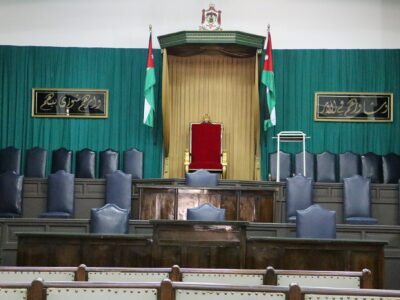
Image by Mariam A, based on a public domain photo by Jak from Wikimedia Commons.
Amidst fervent opposition from civil society, King Abdullah II of Jordan issued a decree on August 12, 2023, giving his endorsement to a controversial “Cybercrime Law.” The decision sparked concerns among international and local rights groups regarding potential threats to digital rights and freedom of expression within the country.
After receiving approval from both houses of the parliament, the royal decree represents the penultimate phase in the constitutional process of enacting laws within the country. The law will then need to be published in the official newspapers to become legally binding.
The Jordanian authorities have affirmed that the recent amendments to the 2015 cyberlaw, which consists of 41 articles, are not designed to curtail freedoms. They claim that these changes are focused on addressing concerns related to “disinformation,” “hate speech,” and “online defamation.” Reuters has reported that “the government denies seeking to stifle dissent but says the law is intended to protect people from blackmail on the internet.”
According to Associated Press (AP), opposition lawmakers argue that this amendment to the law will broaden state control over media and impose penalties on dissenting voices towards the government. Opposition lawmaker Saleh Al-Armoiti was quoted in AP as saying, “This law is disastrous and will lead to turning Jordan into a large prison.”
The law constitutes a significant threat to digital rights, encompassing critical aspects such as freedom of expression and the right to access information, according to a statement endorsed by over than 22 local and international organizations. Amnesty International has highlighted that, “The legislation will jeopardize digital rights, including freedom of expression and the right to information, and will ultimately fail in achieving the Jordanian government’s stated goals of tackling ‘disinformation,’ ‘hate speech,’ and ‘online defamation.’
The law ignores international standards for rights
Although Jordan has ratified the International Covenant on Civil and Political Rights, certain articles within the amendments do not adhere to international human rights standards and principles.
We have read the Cybercrime Draft Law, so you don't have to. Our verdict? It should be completely rejected.
Let's have a look at the articles that most affect Internet Freedom, explained in plain language: (1/8) pic.twitter.com/JTeocFx034— Jordan Open Source Association (JOSA) (@jo_osa) July 22, 2023
The law imposes severe penalties, potentially resulting in imprisonment for up to 5 years and fines of up to JOD 70,000 (approximately USD 99,000), a disproportionate amount in a nation where a third of the population resides below the poverty line, and the minimum wage stands at JOD 286 (around USD 400) per month. The fact that these penalties are applicable even to ordinary social media users is particularly concerning.
Expert in media laws Yahya Choucair told SMEX, a Lebanese NGO promoting digital rights in the region:
Anyone who reads the provisions of Articles 15, 16, and 17 of the Cybercrime Law will realize that the severe fines, which reach 70,000 Jordanian dinars, completely nullify the right to freedom of opinion and expression.
The amendments use ambiguous and undefined terminology, including “fake news,” “promoting, instigating, aiding or inciting immorality,” “online assassination of personality,” “provoking strife,” “undermining national unity,” and “contempt for religions.” This establishes a potential avenue to punish people for exercising their right to free expression and leaves a lot of room for interpretation. In most cases, this circumstance could compel judges to convict citizens.
The new law also requires companies with social media platforms that are owned by foreign entities to open offices in Jordan if those platforms have more than 100,000 users. This provision aims to make it easier for the companies to respond to requests and notifications made by domestic judicial and official authorities within the country.
A prevailing pattern of efforts to stifle freedom of expression
Authorities in Jordan have demonstrated a growing inclination to target peaceful dissent within the nation in recent years. This most recent development highlights a larger pattern and is representative of an ongoing trend.
In a report dated September 2022, Human Rights Watch highlighted that the authorities in Jordan employ loosely phrased criminal laws and provisions to criminalize speech, association and assembly:
“[These provisions] give authorities significant leeway to pursue charges without any clear connection to criminal wrongdoing, with a chilling effect on freedom of expression.”
In line with this general trend, media freedom is also used to limit the coverage of sensitive topics. The ban on TikTok at the beginning of 2023, which was aimed at limiting the spread of live videos showcasing protests by truckers and public transportation drivers in the southern Jordanian city of Ma’an, serves as an example of this trend.
Another noteworthy incident involves the recent ban of UK-based Jordanian award-winning political and social satire magazine AlHudood, a renowned commentary of everyday life in the Arab world. The magazine made fun of a government campaign promoting the crown prince’s lavish wedding. The campaign was held in the midst of economic difficulties in Jordan, where many people are struggling to make ends meet. Access to the magazine’s site was subsequently restricted. In an article at newlines magazine, AlHudood co-founder Isam Uraiqat explained:
While we aren’t certain why we did get blocked, the chances are that it was because a few weeks ago we conducted special coverage of the event of the year — the Jordanian royal wedding.
As Jordan supports the contentious “Cybercrime Law,” concerns over online freedom of speech and data privacy are growing. This emphasizes the ongoing conflict between security and fundamental freedoms in the nation along with a troubling pattern of limiting dissent and media freedom. The delicate balance between these forces continues to be a significant obstacle for Jordan's future despite growing opposition.



